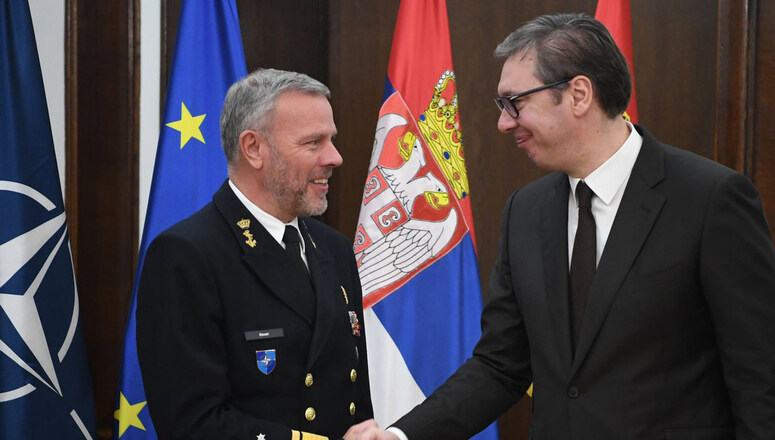On 27 and 28 October 2022, the Chair of the NATO Military Committee, Admiral Bauer was in Serbia, where he met with Serbian President Aleksandar Vučić, the Minister of Defence, Miloš Vučević, the Minister of Foreign Affairs, Ivica Dacic, the Acting Assistant Minister of Defence Policy, Predrag Bandić, and the Chief of Defence, General Milan Mojsilović. He also visited the NATO Military Liaison Office and gave a lecture at the University of Defence Military Academy. Throughout the visit, Admiral Bauer was accompanied by Colonel Milan Ranković, the Serbian Military Representative and Head of the Mission to NATO.

In his meeting with the Chief of Defence, Admiral Bauer reiterated NATO's respect for Serbia's policy of military neutrality, while highlighting the mutual benefits that have resulted from the ongoing NATO-Serbia cooperation. "The purpose of my visit is to discuss how NATO and Serbia can continue to work together to strengthen the capabilities of its Armed Forces. Over the past sixteen years, we have helped Serbia reform its security forces and institutions, by increasing interoperability with Allied troops and strengthening the capacities of the Serbian Armed Forces. We have much to gain and to learn from each other", he added.
Admiral Bauer then met with the Acting Assistant Minister of Defence Policy, Predrag Bandić. The two discussed the current security situation in the Western Balkans and the increase in malicious activities, such as cyber-attacks, hacking, disinformation, intimidation and other destabilizing activities. "The Western Balkans is a region of strategic importance. Across the Western Balkans, NATO has three overarching goals: strengthening stability, increasing resilience and building greater cooperation. NATO-Serbian cooperation enhances Serbia's as well as NATO's security. We are all working together to maintain peace and prosperity for our citizens", emphasised Admiral Bauer.
The second day started with a meeting with the President H.E. Aleksandar Vučić. Admiral Bauer noted the important and stabilising role Serbia is playing in the region: "NATO fully respects Serbia's policy of military neutrality. The partnership that we have built over the last sixteen years is based on Serbia's request. It is tailored to Serbia's needs. And it is mutually beneficial. NATO-Serbia cooperation is based on strength and mutual respect". The newly appointed Minister of Defence, Miloš Vučević, joined them.
Admiral Bauer then addressed the University of Defence Military Academy, where he spoke on the NATO-Serbia partnership in this new era for global security: "Armed forces are one of the key pillars of the state. There is no nobler duty than the protection of one's country. The cooperation between NATO and Serbia aims to achieve just that: to strengthen Serbia's security. Security is a team effort and it requires strengthened relationships and partnerships".
Sitting down with the Minister of Foreign Affairs, Mr Ivica Dacic, Admiral Bauer commended Serbia for its cooperation with NATO on many levels - political, military and scientific. "Exchanging best practices and expertise in areas such as energy and environmental security, cyber-defence and resilience, protection of critical infrastructure and counter-terrorism, can only help the cooperation between NATO and Serbia", he underlined.
The programme concluded with a visit to the NATO Military Liaison Office where Admiral Bauer met with its Chief, Brigadier General Antonello Messenio Zanitti. Since 2006, this liaison office has been facilitating Serbia's cooperation with NATO under the Partnership for Peace Programme and supports Serbia's efforts in matters of defence sector reform through a joint Serbia-NATO Defence Reform Group.






